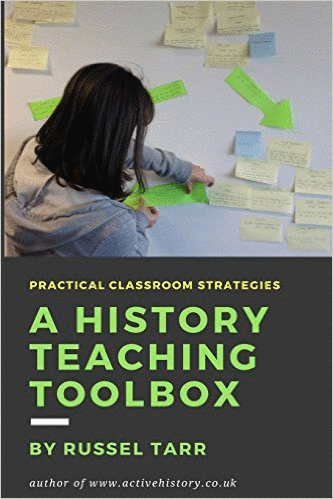World History teaching resources for the high school classroom: lesson plans, worksheets, quizzes and simulation games for KS3, IGCSE, IB and A-Level teachers.
ActiveHistory provides a comprehensive range of podcasts based around the topics and materials available at the ActiveHistory IBDP History Hub!
 |
 |
| Follow on Spotify | Follow on Apple Podcasts |
A number of these will be accompanied by a student worksheet, teacher notes and an online multiple-choice quiz, as shown below. To request similar resources for one of the podcasts episodes not yet listed here, contact me.
You might also be interested in the ActiveHistory Podcast Archive, and the ActiveHistory Video Archive.
The Chilean Coup of 1973The early years of the Republic are a favourite point of focus for the Cambridge IGCSE Modern World History examination. This podcast, building on the interactive decision-making simulation at ActiveHistory.co.uk, considers the impact of such things as the Armistice, the Treaty of Versailles, and the Constitution in provoking the Kapp Putsch and the Spartakist Uprising. |
Student Worksheet | Teacher Answers | Quiz |
Weimar Germany 1918-21The early years of the Republic are a favourite point of focus for the Cambridge IGCSE Modern World History examination. This podcast, building on the interactive decision-making simulation at ActiveHistory.co.uk, considers the impact of such things as the Armistice, the Treaty of Versailles, and the Constitution in provoking the Kapp Putsch and the Spartakist Uprising. |
Students Worksheet | Teacher Answers | Quiz |
The Meiji RestorationThis podcast covers the Meiji Restoration, which is a new topic of study for IBDP History Paper 1. |
Student worksheet | Teacher notes | Quiz |
IGCSE Sourcework Skills for Paper 2: "Was the Treaty of Versailles Fair?"This podcast is in two main parts. In the first half, the hosts cover the key content of the topic "Was the Treaty of Versailles Fair?". In the second half, they break down some classic sourcework questions to help students understand the demands of each one and to uncover some key historical insights to maximise performance in the examination. |
Student worksheet | Teacher notes | |
Kenyan independence (1945 - 1978)The decolonization of Kenya offers one of the richest and most dynamic case studies for the new IBDP History Paper 1 in 2026: a turbulent struggle shaped by competing nationalisms, racial hierarchies, violent resistance, and shifting imperial strategy. What makes it especially powerful for sourcework is the sheer range of voices and perspectives it produces - British settlers, colonial officials, Mau Mau fighters, moderate nationalists, detainees, newspapers, and later historians all narrate the same events in sharply different ways. For IB students, this topic is a perfect training ground for evaluating bias, comparing interpretations, and understanding how power and perspective shape the historical record. |
Student worksheet | Teacher notes | Quiz |
The Haitian Revolution (circa 1780 - 1811)Explore the Haitian Revolution - the only successful slave uprising in history and a turning point that reshaped the Atlantic world. This podcast uncovers how enslaved people confronted empire, exposed the contradictions of Enlightenment ideals, and forged the first Black republic. Discover why this “unthinkable” revolution still challenges the way we understand freedom, power, and global history. |
Student worksheet | Teacher notes | Quiz |
The Aztec Empire (circa 1428-1469) - Climate and InnovationHow did the Aztec Empire rise to dominance in central Mexico during the early 15th century? In this episode, we explore the political structures, military strategies, economic systems, and cultural achievements that defined the empire between 1428 and 1469. A rigorous, evidence-based examination of one of Mesoamerica’s most influential civilizations. |
Student worksheet | Teacher notes | Quiz |
Apartheid South Africa, 1948-64What defined the early decades of apartheid, and how did these policies reshape South African society? In this episode, we examine the origins, implementation, and impact of apartheid from 1948 to 1964, analysing state legislation, the rise of resistance movements, and the growing international response. A rigorous, evidence-based exploration of one of the most significant systems of racial segregation in modern history. |
Student worksheet | Teacher notes | Quiz |
Rule of Mao and Castro: Compared and ContrastedHow did Mao Zedong and Fidel Castro reshape their nations, and where do their paths converge or diverge? In this episode, we compare and contrast the political aims, governing strategies, economic policies, and social transformations pursued under their rule. Through a clear, evidence-based analysis, we examine the successes, challenges, and historical legacies of two of the 20th century’s most influential revolutionary leaders. |
Student worksheet | Teacher notes | Quiz |
Feminism in the Americas: Causes and ImpactWhat drove the rise of feminist movements across the Americas, and how have they reshaped societies from the 19th century to today? In this episode, we examine the political, social, and economic forces that sparked feminist activism, exploring its impact on rights, legislation, culture, and everyday life. A clear, evidence-based analysis for students, researchers, and anyone interested in the history of gender and social change. |
Student worksheet | Teacher notes | Quiz |
Red Scare: Causes and ImpactWhat triggered the fear of communism in the United States, and what were its lasting effects? In this episode, we explore the social, political, and international factors behind the Red Scare, examining its impact on American politics, civil liberties, and society. A rigorous, evidence-based analysis for students, history enthusiasts, and curious listeners. |
Student worksheet | Teacher notes | Quiz |
Korean War: Significance for two countries of the AmericasHow did the Korean War shape the political, military, and diplomatic trajectories of the United States and Canada? In this episode, we analyse the war’s significance for both countries, examining how it influenced foreign policy, military strategy, and international relations during the early Cold War. A detailed, evidence-based discussion for history enthusiasts and students alike. |
Student worksheet | Teacher notes | Quiz |
Mao's Rule of China: Aims, successes, failuresWhat were Mao Zedong’s goals for China, and how successful was he in achieving them? In this episode, we examine the political, social, and economic policies of Mao’s leadership, evaluating both the accomplishments and the profound challenges of his transformative but controversial rule. |
Student Worksheet | Teacher notes | Quiz |
Norse exploration (circa 982 - 1020): Climate and innovationHow did Norse explorers navigate and settle across the North Atlantic between 982 and 1020? In this episode, we examine the role of climate conditions, technological innovation, and seafaring expertise in shaping Norse expansion to Iceland, Greenland, and Vinland, highlighting how environmental and cultural factors drove exploration. |
Student worksheet | Teacher notes | |
Historiography in IBDP HistoryThis podcast investigates how IBDP History students can make use of historiography in their written work. It considers key themes and insights from excerpts of works by E.H. Carr, John Lewis Gaddis, John Tosh, and John Lukacs. These historians offer diverse perspectives on the nature of history, its relationship to other disciplines, and the role of the historian. |
Student Worksheet | Teacher Notes | Quiz |
Book Review - "The Cold War: A New History" by John Lewis GaddisIn this episode, we review The Cold War: A New History by John Lewis Gaddis, examining how the author interprets the global conflict that defined the second half of the twentieth century. We discuss Gaddis’s analysis of key events, superpower rivalry, and the ideological, political, and economic forces that shaped the Cold War era. |
Student Worksheet | Teacher Notes | Quiz |
The Chinese Civil War and the Rise of Mao ZedongHow did decades of civil conflict shape the emergence of Mao Zedong as the leader of the People’s Republic of China? In this episode, we examine the origins, key turning points, and outcomes of the Chinese Civil War, analysing how military strategy, political ideology, and social mobilisation propelled Mao and the Chinese Communist Party to victory. |
Student Worksheet | Teacher Notes | Quiz |
The Causes of the Korean WarThis episode examines the multi-layered causes of the Korean War, from the legacy of Japanese occupation and the division of Korea in 1945 to the evolving strategies of the United States, the Soviet Union, and China. We analyse how local ambitions and global Cold War dynamics converged to ignite conflict on the peninsula. |
Student Worksheet | Teacher Notes | Quiz |
How did World War One precipitate the Russian Revolution of February 1917?How did World War One push Russia toward the breaking point in February 1917? In this episode, we analyse the war’s effects on the economy, the military, social cohesion, and the legitimacy of the Tsarist government to understand how wartime pressures produced a revolutionary crisis. |
Student Worksheet | Teacher Notes | Quiz |
How stable was the Tsarist regime in Russia on the eve of World War One?How crucial was World War One in bringing about the Russian Revolution of October 1917? In this episode, we analyse the war’s impact on Russia’s economy, society, military, and political legitimacy to assess whether it acted as the decisive trigger or merely intensified long-standing tensions. |
Student Worksheet | Teacher Notes | Quiz |
How significant was World War One as a cause of the Russian Revolution of October 1917?Covers a central part of the IGCSE coursework assignment ("How significant was World War One for Russia?"). |
Student Worksheet | Teacher Notes | Quiz |
How significant was World War One as a cause for Stalin's Rise to power?Covers a central part of the IGCSE coursework assignment ("How significant was World War One for Russia?"). |
Student Worksheet | Teacher Notes | Quiz |
How successful were Castro's policies towards women?Investigates a key question connected to Authoritarian States (Paper 2) and The Americas (P3). |
Student Worksheet | Teacher Notes | Quiz |

© 1998-2026 Russel Tarr, ActiveHistory.co.uk Limited (Reg. 6111680)
1 Torrin Drive, Shrewsbury, Shropshire, SY3 6AW, England
Privacy Policy | Contact






